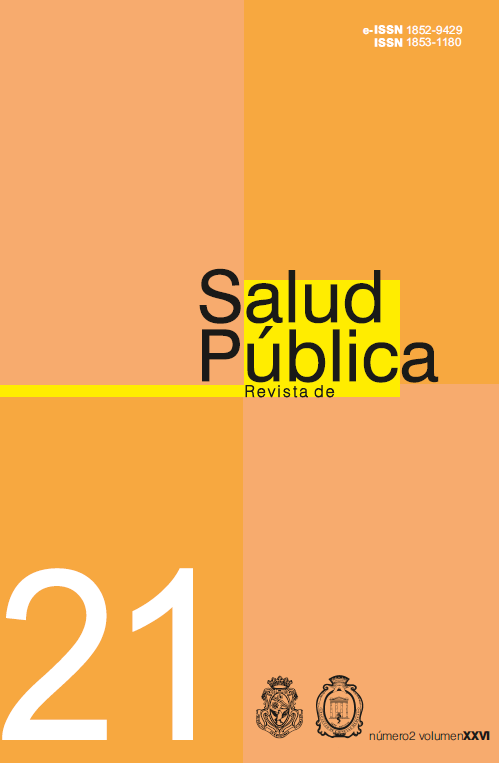SELF-CARE PRACTICES FOR YOUNG PEOPLE IN CONFINEMENT
Keywords:
health; young boys; self-careAbstract
Objective: To recognize the self-care practices of young people in confinement situations housed in the socio-educational centers of the Juvenile Penal Area of the Province of Córdoba, Argentina.
A qualitative research was carried out in which 32 young people, aged 14 to 18, of both sexes participated, housed for a period of no less than six months in the socio-educational centers under study.
Results: Young people report practices aimed at caring for their body and the oral component in order to avoid pain and disease. If there is no disease, there are no self-care practices; intentional practices are generated in the face of pain and suffering. Self-care is guided from the maternal role. Feeding practices are subordinated to practices that affect health. The situation of confinement generates practices different from the ¨outside¨.
Conclusions: The circumstantial context, be it that of origin, that of the street or that of confinement conditions self-care practices.
Downloads
References
1. Iriart C, Waitzkin H, Breilh J, Estrada A. Merhy EE. Medicina social latinoamericana: aportes y desafíos. Rev Panam Salud Pública. [Internet] 2002 [Consultado 27 de Marzo de 2016]; 12(2):128-36.Disponible en: http://www.unida.org.ar/Bibliografia/documentos/Salud%20Comunitariaa/M4/BiblioM4/MEDICINASOCIAL.pdf
2. Menéndez E. Modelos de atención de los padecimientos: de exclusiones teóricas y articulaciones prácticas. Ciência&SaúdeColetiva. 2003; 8(1):185-207.
3. Sacchi M, Hausberguer M, Pereyra A. Percepción del proceso salud enfermedad atención y aspectos que influyen en la baja utilización del Sistema de Salud, en familias pobres de la Ciudad de Salta. Salud Colectiva. 2007; 3 (3):271- 283.
4. Burak SD. Adolescencia y juventud. Viejos desafíos en los albores del nuevo milenio. En: Burak SD (comp).Adolescencia y juventud en América Latina. Libro Regional Universitario [Internet]. Costa Rica: Ed. Tecnológica; 2001.p.20-36. [Consultado 20 de Julio de 2011]. Disponible en: http://www.binasss.sa.cr/adolescencia/Adolescenciayjuventud.pdf
5. Moreno Altamirano L. Reflexiones sobre el trayecto salud-padecimiento-enfermedad-atención: una mirada socioantropológica Salud Pública de México. [Internet] 2007 [Consultado 20 de Julio de 2015]; 49(1):63-70. Disponible en: http://www.scielosp.org/pdf/spm/v49n1/a09v49n1.pdf
6. Menéndez E. De sujetos saberes y estructuras: introducción al enfoque relacional en el estudio de la salud colectiva. Buenos Aires: Lugar Editorial; 2009.p.25-72.
7. Consejo de Organizaciones Internacionales de las Ciencias Médicas (CIOMS)/OMS Pautas éticas internacionales para la investigación biomédica en seres humanos. [Internet]. 2002. [Consultado 20 de febrero de 2011]. https://cioms.ch/wp-content/uploads/2017/12/CIOMS-EthicalGuideline_SP_INTERIOR-FINAL.pdf
8. Corin E. The social and cultural matrix of health and disease. En: Evans RG, Barer ML, Marmor TR. The Determinants of Health Populations [Internet]. New York: Routledge; 1994.p.93-132 [Consultado 19 de Diciembre 2015]. Disponible en: https://books.google.com.ar
9. Strauss A, Corbin J. Grunded Theory Research: Procedures, Canons and Evaluative Criteria. Rev Qualitative Sociology [Internet] 1990; 13 (1):3-21. [Consultado 14 de Noviembre 2017] Disponible en: http://med-fom-familymed-research.sites.olt.ubc.ca/files/2012/03/W10-Corbin-and-Strauss-grounded-theory.pdf
10. Barnetche MM. Calidad de vida y proceso salud enfermedad atención a nivel del componente bucal en jóvenes alojados en centros socioeducativos del Área Penal Juvenil de la Provincia de Córdoba. [Tesis] [Internet]. Facultad de Odontología. Universidad Nacional de Córdoba. 2017 [Consultado 27 de Octubre 2017]. Disponible en: https://rdu.unc.edu.ar/handle/11086/4994.
11. World Health Organization, Regional Office for South-East Asia. (2014). Self care for health. WHO Regional Office for South-East Asia. [Internet].1914 [Consultado 19 de Abril 2020] Disponible en: https://apps.who.int/iris/handle/10665/205887
12. Uribe Jaramillo TM El autocuidado y su papel en la promoción de la salud. Investigación y educación en enfermería, 1999; 17 (2) : 109-118
13. Verónica Maricruz de la Fuente-Maldonado, Vanesa Omaña-Martínez, Rosita SooRan Lee-Chun,Brenda Carolina Alavéz-Orato, Hebert Iván Peña-Carrillo, Estefany Sierra-Castañeda.Teens’ knowledge and actions onhealthself-care Revista CONAMED, 2011;16, (1):29-33
14. Carletto-Körber F, Isla C, Abrahim L & Cornejo LS. Knowledge, attitudes, practices and oral health status in adolescents of the city of Córdoba, Argentina. J Oral Res 2018; 7(9):418 - 425. doi: 10.17126/joralres.2018.085
15. Barrenechea Lagos DA, Flores Medina GI, Sulca Campana EK. Self Care Practices in the Physical, Social and Psychological Dimensions in Adolescents of Education, March 2018. [Tesis] [Internet]. Facultad de Enfermería. Universidad Peruana Cayetano Silva.2018 [Consultado 20 de Marzo de 2019]. Disponible en: http://repositorio.upch.edu.pe/bitstream/handle/upch/4381/Practicas_BarrenecheaLagos_Dora.pdf?sequence=1&isAllowed=y
16. Autoatención de los padecimientos y algunos imaginarios antropológicos Eduardo L. Menéndez Desacatos 2018; 58:104-113
17. Omar Fernando Ramírez-de la Roche, Alicia Hamui-Sutton, Ruth Fuentes-García, Rebeca Prácticas de autoatención en pacientes de los tres niveles de atención en instituciones de salud de México Atem Fam 2013; 20(3):91-95
18. Hernández, M. Arenas, R. Valde El cuidado a la salud en el ámbito doméstico: interacción social y vida cotidiana Rev Saúde Pública. 2001; 35 (5): 443-450
19. Aguilar Guzmán O, Carrasco González MI, García Piña MA, Saldivar Flores A, Ostiguín Meléndez RM.Madeleine Leininger: un análisis de sus fundamentos teóricos2007 Revista Enfermería Universitaria ENEO-UNAM.2007 [Internet]. 4. ( 2): 26-30 [Consultado 20 de Marzo de 2019]. Disponible en: http://www.revistaenfermeria.unam.mx/ojs/index.php/enfermeriauniversitaria/article/view/457/439
20. Freud S. El malestar en la cultura. Madrid España Editorial AKAL 1917. 172 pp
21. Velázquez Altamirano M, Córdova Alcaráz AJ, Rodríguez Kuri SE, Fernández Cáceres C. Prácticas de autocuidado en adolescentes en tratamiento por el consumo de drogas. Alternativas en Psicología. 2019. [Internet]. ;(41):8-21[Consultado 20 de Marzo de 2020]. Disponible en: http://www.alternativas.me/attachments/article/189/1.%20Pr%C3%A1cticas%20de%20autocuidado%20en%20adolescentes.pdf
Downloads
Published
Issue
Section
License
Copyright (c) 2021 Escuela de Salud Pública y Ambiente. Facultad de Ciencias Médicas. Universidad Nacional de Córdoba

This work is licensed under a Creative Commons Attribution-NonCommercial 4.0 International License.
Authors who publish with this journal agree to the following terms:
- Authors retain copyright and grant the journal right of first publication with the work simultaneously licensed under a Creative Commons Attribution License which allows the work to be copied, distributed, exhibited and interpreted as long as it is not done for commercial purposes.
- Authors are able to enter into separate, additional contractual arrangements for the non-exclusive distribution of the journal's published version of the work (e.g., post it to an institutional repository or publish it in a book), with an acknowledgement of its initial publication in this journal.
- Authors are permitted and encouraged to post their work online (e.g., in institutional repositories or on their website) after the publication process. (See The Effect of Open Access). (See The Effect of Open Access).



